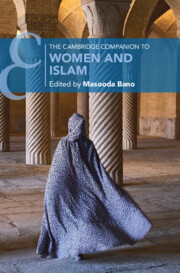Book contents
- The Cambridge Companion to Women and Islam
- Cambridge Companions to Religion
- The Cambridge Companion to Women and Islam
- Copyright page
- Contents
- Contributors
- Preface
- A Note on Foreign-Language Words
- Introduction
- Part I Logic of Classical Reasoning
- 1 Women in the Qur’an
- 2 Women’s Inheritance
- 3 Veiling and Restrictions on Sexual Liberty
- 4 Muhammad: The Ideal Man
- 5 Prophet’s Wives: “Mothers of the Believers”
- Part II Asserting Agency in Faith
- Part III Asserting Agency in Socio-Political Life
- Volume Bibliography
- Index
- Cambridge Companions To … (continued from page ii)
- References
2 - Women’s Inheritance
from Part I - Logic of Classical Reasoning
Published online by Cambridge University Press: 12 April 2025
- The Cambridge Companion to Women and Islam
- Cambridge Companions to Religion
- The Cambridge Companion to Women and Islam
- Copyright page
- Contents
- Contributors
- Preface
- A Note on Foreign-Language Words
- Introduction
- Part I Logic of Classical Reasoning
- 1 Women in the Qur’an
- 2 Women’s Inheritance
- 3 Veiling and Restrictions on Sexual Liberty
- 4 Muhammad: The Ideal Man
- 5 Prophet’s Wives: “Mothers of the Believers”
- Part II Asserting Agency in Faith
- Part III Asserting Agency in Socio-Political Life
- Volume Bibliography
- Index
- Cambridge Companions To … (continued from page ii)
- References
Summary
Sohail Hanif provides a detailed examination of the complex legal debates surrounding women’s inheritance in Islam, particularly within the Hanafi school of law (madhhab). The chapter emphasizes how these debates are highly nuanced, requiring an understanding of how Islamic law balances financial responsibilities between genders, ensuring that what women might seemingly lose in inheritance is offset by their entitlement to maintenance.
- Type
- Chapter
- Information
- The Cambridge Companion to Women and Islam , pp. 64 - 84Publisher: Cambridge University PressPrint publication year: 2025

